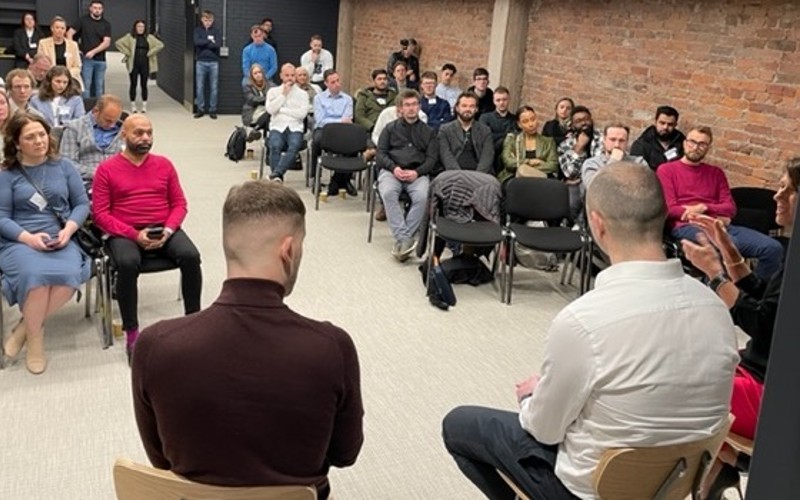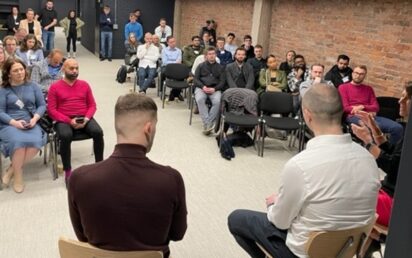Underperforming staff will have nowhere to hide from ChatGPT but businesses shouldn’t be afraid of it.
That was one of the messages from a panel of technology and business experts who spoke at an exclusive event called ‘ChatGPT – what is it and are you ready?’
The technology has taken the world by storm since being launched in November 2022 and has been described as ‘an iPhone moment in AI’.
However question marks have been raised about the reliability of the information it generates and the risk that the technology could be abused, for examples by students who use it to write coursework.
BusinessCloud joined forces with tech recruitment specialist Fairmont to host an exclusive event at their office in Mosley Street, Manchester on March 2nd.
Glyn Powditch, co-founder of Dream Agility, said: “It’s the end of the plodder, people who don’t ask questions. You’ve now got this amazing piece of technology and you ask it questions and it will go off and do pretty much whatever you’ve asked it to do. Not only will it do that, but it will autonomously improve over time.
“ChapGPT means the end of mediocrity and people who in their job don’t ask questions and have to be told what to do and wait to be asked. If you’re a plodder you should be very worried about it.”
Jack Donohue, CEO of Fairmont Recruitment, said they used ChapGPT to produce a document in three hours that had previously taken three months.
He said: “We’re using ChapGPT in a variety of ways. We can use it for content creation for helping our clients with job adverts and job descriptions. For ourselves it helps us create internal content or training documents.
“We were working on a document for three months, which was a school of excellence for Fairmont Recruitment. We started using ChatGPT and we were able to create a 36-page document in three hours. It helps you create a baseline and then you can add your creativity on top of it.
“These people who are just sat there are going to get found out pretty quickly. ChatGPT shouldn’t be something to be afraid of. People should look at how they can implement this into their day-to-day work life.”

Naomi Timperley, Tom Liptrot. Glyn Powditch – ChatGPT
Tom Liptrot, machine learning engineer at Ortom, said ChatGPT had changed the world of AI in terms of its multiple uses.
“It’s massive,” he said. “It’s the first application of AI that’s really useful for lots of things. It’s a lot more robust against producing toxic content and horrible stuff. There’s always going to be demand for stuff that is made by people. This is a tool that is useful for lots of writing applications but I don’t think it’s going to replace poets any time soon.”
Naomi Timperley, co-founder of Tech North Advocates and We Are GSI, urged the 70-strong audience not to be afraid of ChatGPT.
“We should embrace it across business and education,” she said. “I’m a big fan. I don’t think anybody should be worried about it. Copywriters are scared they’re going to lose work but ChatGPT is only as good as the information that you input into it.
“It’s about embracing it and not being scared of how to use it. This is going to be amazing for many people. You use it as an enhancer and an enabler. Don’t be scared of it.”
Sarah Harkness is the managing director of Stockport-based IN Accountancy and an early adopter of ChapGPT.
“We’ve done quite a lot of little stuff with ChatGPT,” she said. “We’ve written quite a lot of content for our marketing and our website and I’ve found it a really good starter.
“I’ve used it for inspiration on how to give me ideas on what content might be relevant for certain industries, titles for articles to write, ideas for marketing plans.
“I’ve always said in life before now ‘systemise the routine and humanise the exception’. I’d change that now to ‘automate the routine stuff that can be done day-in, day-out and humanise the exception’. That frees up the human brain to get more creative, more intelligent and lift standards of excellence. It’s vital to fact check everything.”
Rich Somerfield is the chief technology officer of Manchester-based LegalTech firm Summize. He said: “Summize aims to make legal easy and one of the elements of that is trying to understand what’s in a contract.
“We leverage one of the models from OpenAI to help understand and convert what’s actually in the contract into more human, readable form.
“We 100 per cent saw ChatGPT as an opportunity. We brought it to the product fairly quickly – less than three weeks from the idea to being in the customer’s hands.
“As long as you give it the right kind of information the output is incredible. The key awareness is that the model itself loves generating text. It doesn’t really care too much if that text is high quality and answers your question. It’s making sure what you put in and what you get out is what you need.”


